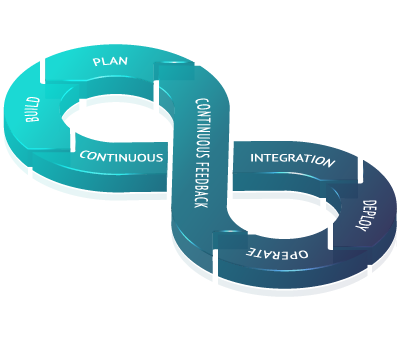DevOps Services for Automotive Industry
The automotive sphere actively innovates and participates in software innovation and DevOps methodology, which wins the customers’ trust. Automotive manufacturing has reached a stage where its technology is closely tied to software development and rollout. Automotive DevOps and CI/CD processes enable manufacturing to accelerate safe applications, web products for managing internal processes, and business additions.

Technology Stacks we use
At the beginning of the use of cloud platforms, moments with the transfer of the infrastructure and its individual components are identified. To facilitate the migration, there is a list of services that help with the migration of almost any data.
Cloud Providers

Containers and Orchestration
CI/CD
Configuration management
Databases
Service
Monitoring

Infrastructure Provisioning

Our Services
We ensures high-quality analysing large volumes of data through DevOps in the automotive industry. The process of improving software development allows you to decrease the time to market and achieve a first-class performance. Executing cloud computing services in your organisation significantly shortens the development cycle with uninterrupted delivery.
Cloud Development
Our DevOps team helps your enterprise build software on cloud platforms like Amazon Web Services. This process provides agility in production and product deployment. Cloud development satisfies throughput optimization requirements, and your automotive business can scale up or down.
Cloud Integration
Integrating automotive applications with cloud services provides comprehensive data admission and visibility. It is essential to eliminate data silos, improve business operations and seamlessly exchange information between cloud systems.
Test automation
Our experts conduct quality control testing of operations through cloud computing use, which is adapted to automotive manufacturing. We utilise Agile methodologies software tools and validation is automatically performed by continuous integration instruments.
CI/CD Providing
Bionicfoxassists to create and implement cloud-based ongoing integration and delivery. These technologies provide constant automation and regular monitoring throughout the annex elaboration cycle, validation, integration, delivery and deployment.
The stages...
Automotive cloud computing allows fabricators to innovate, while DevOps experts upgrade software through automated processes. Implementing DevOps requires careful execution, timing, and the right strategy. Our engineers apply a robust DevOps execution plan to your automotive industry.
Planning
Our team captures your business requirements and takes into account the desired result. Based on this data, we create a product roadmap before your developers start making code.
Infrastructure Integration with CI/CD
This integration solves configuration governance and productive deployment issues. These tools achieve risk resilience through constant monitoring and regular software upgrades.
Testing
Our team conducts beta testing before releasing the product to maximum detect bugs. Test automation scans software security, verifies for infrastructure modifications and hardware accordance.
Deployment and Monitoring
Our team automates the release and makes the process robust and hassle-free utilising infrastructure as code. Subsequent monitoring detects, prioritises and isolates software defects.
Benefits of our DevOps services
The cloud technologies and DevOps usage allow you to organise production and switch to a structured development environment. Cloud computing in automotive usage reduces elaboration expenses, ensures consistent quality, decreases time-to-market, and lowers service interruptions.
Automated Quality Managing
Test automation is a core part of DevOps and with the introduction of ongoing testing and integration. Cloud computing improves processes, management, it increases work transparency and allows you to quickly respond to data coming from different sources.
Fast Delivery
Our DevOps realisation implies frequent delivery rounds and minimal failover time. Through continuous integration, further innovations are produced. Also, when using DevOps, each department is responsible for maintaining the stability of their duties, so the delivery velocity is uninterrupted.
Digital Modification
Automotive business operations are actively transforming and innovation is the driving force. This benefit improves the customer experience and increases employee productivity. Also, DevOps is a key aspect of digital products and services’ timely delivery.
Automotive Process Improvement
Vehicles are controlled by software and support core functions such as navigation and electronics. DevOps quickly resolves software issues and refines performance. This methodology is focused on replacing outdated practices for making and deploying software, also lowing the time to market.
Accelerate time to market and innovate more in your automotive business!
FAQ
What are the basic types of cloud ?
The main types are public clouds, private clouds, hybrid clouds, and multi-clouds.
What are the Benefits of Cloud Computing?
Cloud computing has many advantages, its implementation in the company brings high velocity, automatic software updates and integration, expenses reduction, data safety, mobility, unlimited storage capacity, reserve copying and recovery.
Is the Cloud a Secure Ecosystem?
Yes, cloud storage is more secure than on-premise centers as vendors invest in data protection and include built-in safety features. The data stored on the servers is encrypted, which protects against cyber attacks. Also, cloud servers provide access to confidential information only to authorised persons.